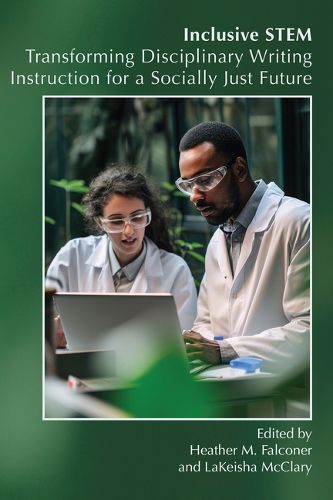Readings Newsletter
Become a Readings Member to make your shopping experience even easier.
Sign in or sign up for free!
You’re not far away from qualifying for FREE standard shipping within Australia
You’ve qualified for FREE standard shipping within Australia
The cart is loading…






Encompassing a diversity of STEM education contexts, this edited collection offers instructional strategies and assignments for creating equitable, inclusive classrooms. With a focus on writing instruction, each chapter presents ways to create space for individuals and voices historically marginalized in STEM disciplines. Contributions move beyond typical disciplinary writing and content instruction and instead focus on work that is intentionally, sometimes subtly, disrupting the assumptions of STEM writing, communication, and knowledge-making. Contributors consider how we can create a sense of belonging for students from groups that have historically been kept out of these disciplines, how faculty can consciously create space for student voices to be heard, and how to do so with an eye toward the discursive practices of STEM disciplines. The chapters in Inclusive STEM offer specific cases--classroom- or research-based contexts--that describe their intents and goals, the interventions they enacted, how students responded, and the unexpected elements that presented themselves. These chapters also reveal the ugly bits: sharing lessons learned and errors made. The collection targets educators who teach disciplinary content, as well as writing in STEM.
$9.00 standard shipping within Australia
FREE standard shipping within Australia for orders over $100.00
Express & International shipping calculated at checkout
Stock availability can be subject to change without notice. We recommend calling the shop or contacting our online team to check availability of low stock items. Please see our Shopping Online page for more details.
Encompassing a diversity of STEM education contexts, this edited collection offers instructional strategies and assignments for creating equitable, inclusive classrooms. With a focus on writing instruction, each chapter presents ways to create space for individuals and voices historically marginalized in STEM disciplines. Contributions move beyond typical disciplinary writing and content instruction and instead focus on work that is intentionally, sometimes subtly, disrupting the assumptions of STEM writing, communication, and knowledge-making. Contributors consider how we can create a sense of belonging for students from groups that have historically been kept out of these disciplines, how faculty can consciously create space for student voices to be heard, and how to do so with an eye toward the discursive practices of STEM disciplines. The chapters in Inclusive STEM offer specific cases--classroom- or research-based contexts--that describe their intents and goals, the interventions they enacted, how students responded, and the unexpected elements that presented themselves. These chapters also reveal the ugly bits: sharing lessons learned and errors made. The collection targets educators who teach disciplinary content, as well as writing in STEM.